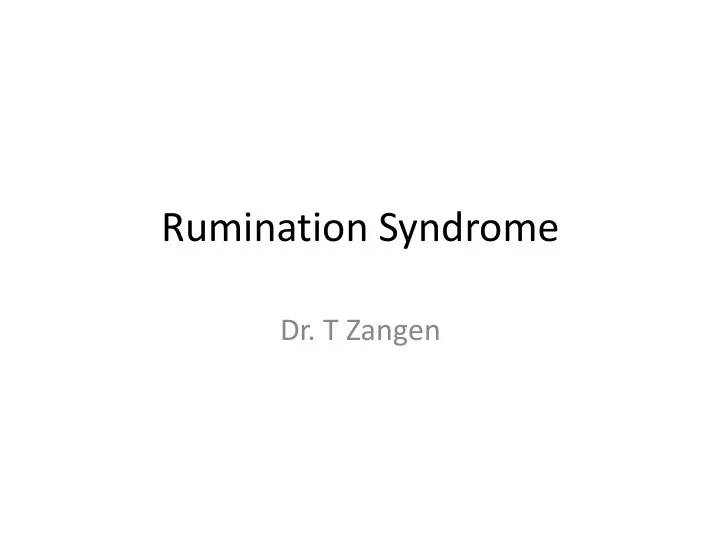

Rumination Syndrome Dr. T Zangen
Case vignette-1 • 18 yo F Persisting expulsion of food immediately after ingestion of any kind or amount of solid or semisolid food, lasting for 2 years. Past medical hystory: • Celiac Disease , on gluten free diet for 10 y • Chronic back and hip pain for years, medical treatment by pain clinic ( celebrex, lyrica) • Current sole medication : Omepradex
Case vignette -2 • Persisting expulsion of food immediately after ingestion of any kind or amount of solid or semisolid food, lasting for 2 years. • Symptoms of dyspepsia and vomiting started 3 years ago following an acute gastroenteritis • Vomiting worsened after cholecystectomy (for gallbladder sludge) complicated by weight loss • Few episodes of fecal load and constipation
Case vignette -3 • Tolerates well clear liquids an coconut water • No abdominal pain, heartburn, fever, diarrhea, abdominal distention, headache
Workup-1 • Endoscopic examinations-normal (numerous) • Radiology: abdominal CT scan, MRE, MRI-brain, -normal • Metabolic, Endocrine, Allergy tests-normal • Neurologic and neuro-genetic consult: normal EMG-N, MNGIE- excluded, mitochondrial disease excluded. • Autonomic nervous system workup- normal • Psychiatric assessment- normal, eating disorder excluded • Blood biochemistry- normal, blood counts normal except some neutropenia
Workup-2 • Gastric transit study (for gastroparhesis): solid emptying a little more rapid than normal range. • Esophageal manometry (without impedance): normal, regular 10 swallows, without a meal. • No antroduodenal manometry performed Diagnosis by Neurogastroenterogists • Intractable vomiting • Functional vomiting with gastric hypersesitivity Rumination syndrome???
Treatment • Medications: No improvement: Pregabalin, Amitriptylin, Quetiapine, Mitrazapine Some improvement: Ondansetron, Omepradex, Sertaline • Elimination diet- failed • Diaphragmatic breathing exercises, biofeedback, hypnosis- didn’t work • Gastric pacemaker placement - eliminated nausea but no improvement in vomiting • NJ tube feeding, PEG\PEJ feeding improved nutrition and weight gain (multiple tube dislodging ) • Formal jejunostomy planned
Discussion • Would you do an antrodoudenal manometry to confirm the diagnosis of Rumination syndrome? Additional tests? • What is the entity of “Functional vomiting with gastric hypersensitivity”? • What in your experience are the treatment options in this case ?
Dear Dr Zengen, I wanted to update you on Daniella’s progress . • Emend (aprepitant) 165 mg daily • This drug is currently being trialled for treating gastroparesis in the US • After 10 days, she started to notice an impact • Progressively she was able to eat larger quantities • Today she can eat a normal meal albeit consumed slowly and in a relatively small quantity. • She has not used the feeding tube for over a week. She has gained weight
B3b. Functional Vomiting Diagnostic criteria * Must include all of the following: 1 .On average one or more episodes of vomiting per week 2 . Absence of criteria for an eating disorder, rumination, or major psychiatric disease according to DSM-IV 3 . Absence of self-induced vomiting and chronic cannabinoid use and absence of abnormalities in the central nervous system or metabolic diseases to explain the recurrent vomiting * Criteria fulfilled for the last 3 months with symptom onset at least 6 months prior to diagnosis
H1a. Adolescent Rumination Syndrome Diagnostic criteria* Must include all of the following: • 1. Repeated painless regurgitation and rechewing or expulsion of food that • a. begin soon after ingestion of a meal • b. do not occur during sleep • c. do not respond to standard treatment for gastroesophageal reflux • 2. No retching • 3. No evidence of an inflammatory, anatomic, metabolic, or neoplastic process • that explains the subject’s symptoms • * Criteria fulfilled for the last 3 months with symptom onset at least 6 months prior to diagnosis
B4. Rumination Syndrome in Adults Diagnostic criteria Must include both of the following: • 1. Persistent or recurrent regurgitation of recently ingested food into the mouth with subsequent spitting or remastication and swallowing • 2. Regurgitation is not preceded by retching Supportive criteria • 1. Regurgitation events are usually not preceded by nausea • 2. Cessation of the process when the regurgitated material becomes acidic • 3. Regurgitant contains recognizable food with a pleasant taste
Recommend
More recommend